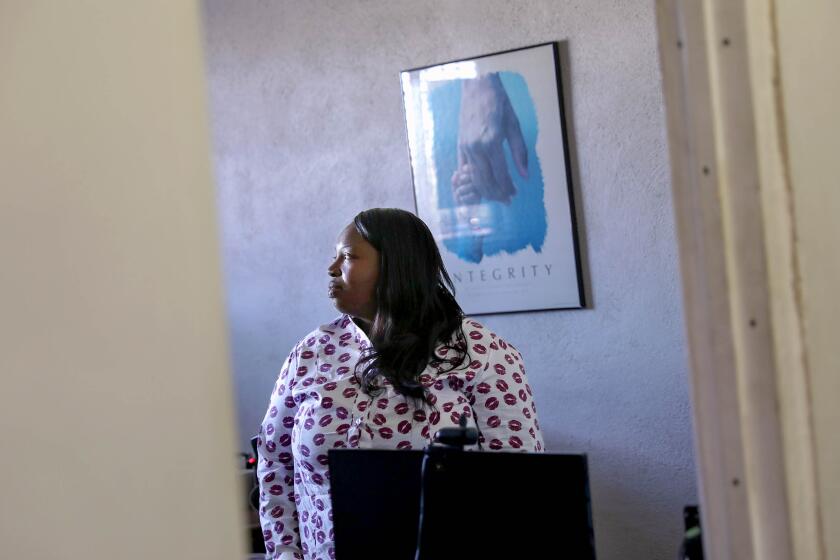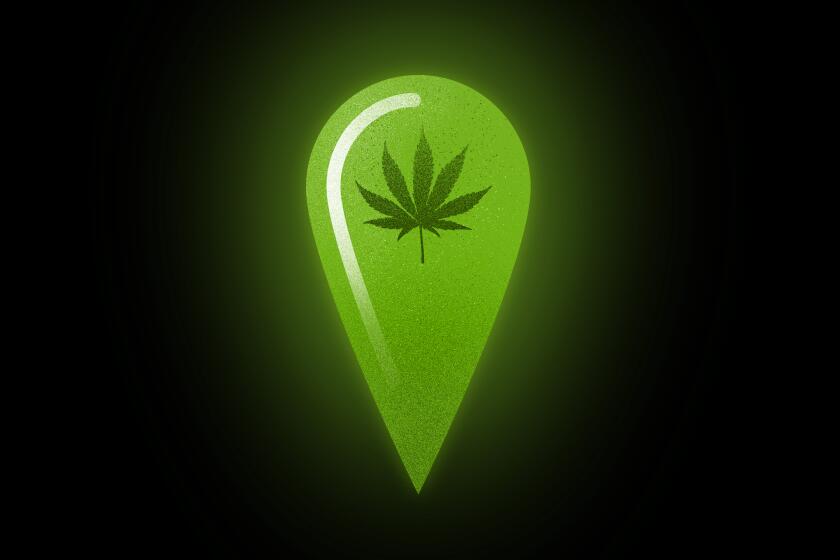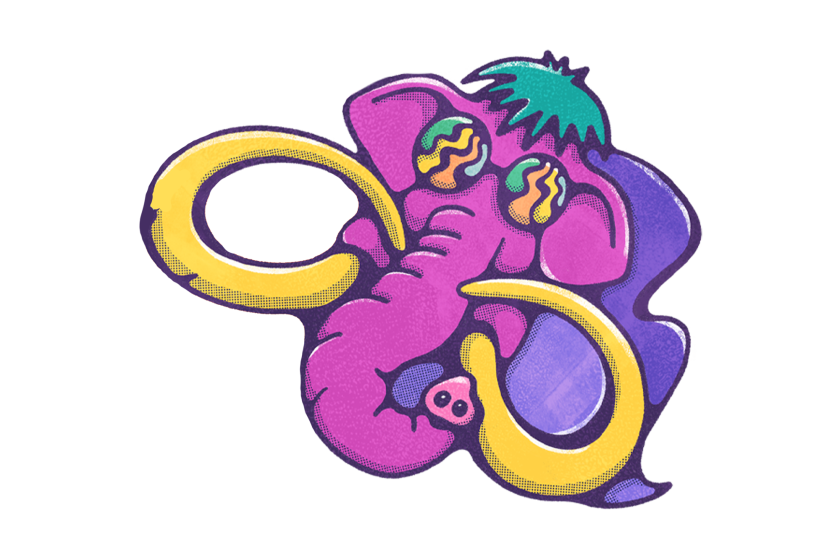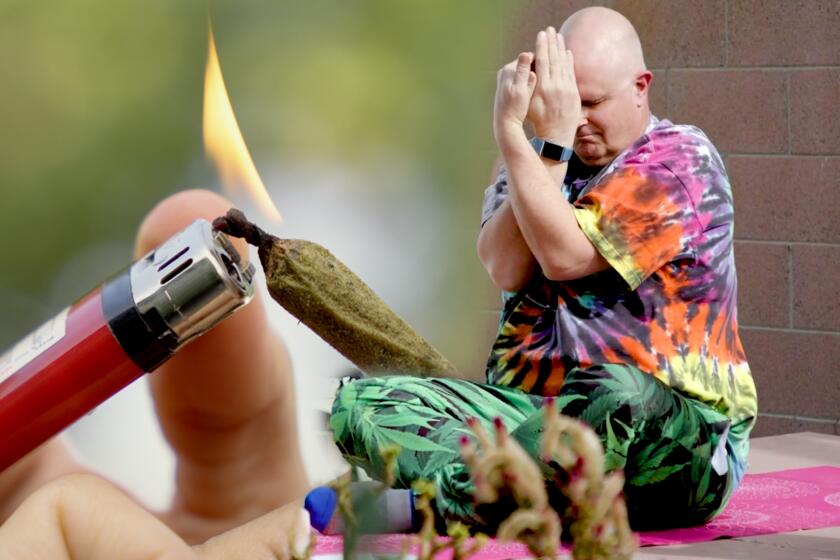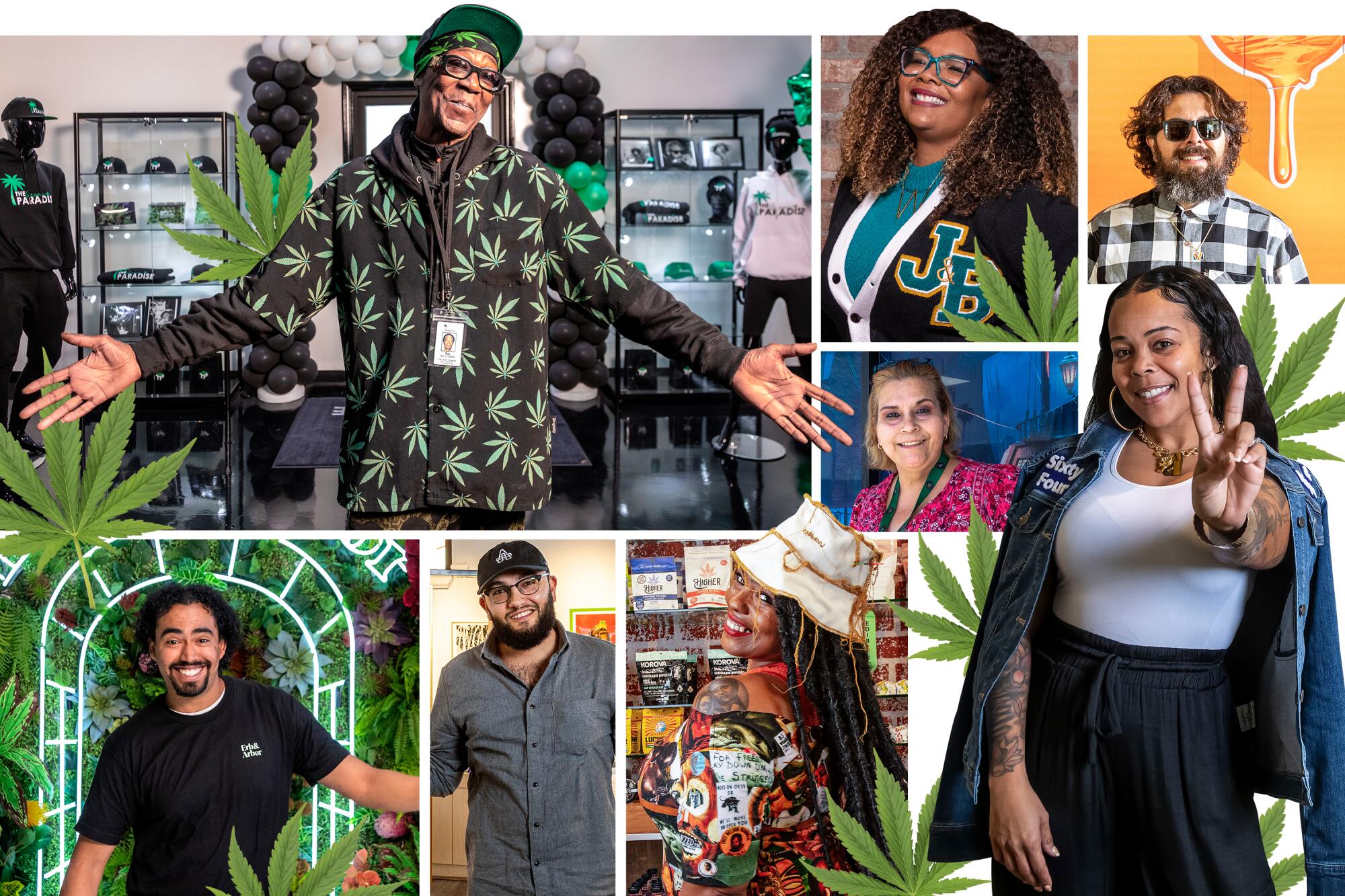
In the wake of California’s legalization of recreational-use cannabis, many cities — including Los Angeles — put in place programs designed to help budding cannabis entrepreneurs who had been unduly affected by the war on drugs get a leg up in the legal weed scene. L.A.’s program attempted to right past wrongs by considering three factors when awarding new cultivation, manufacturing and retail (dispensary) licenses: prior marijuana-related arrests, income level and the length of time living in an area of the city disproportionately affected by cannabis convictions.
The keyword here is “attempted,” because from the moment the application-filing process for the first 100 new dispensary licenses opened in September 2019, the city program has been a clown car careening off a cliff thanks to computer glitches, backlogs and charges of mismanagement at the city’s Department of Cannabis Regulation. It all came to a head in 2020 with a well-publicized lawsuit that resulted in L.A. adding a second batch of 100 social equity dispensary licenses to the mix — all before any had even opened. In the meantime, those with cash on hand, established investor connections or family funds had been operating pot shops throughout L.A. and cashing in on the green rush. Finally, in April 2021, nearly 20 months after the city started accepting applications, the first social equity dispensaries opened.
A year later, we now have a new understanding of which social equity applicants successfully navigated the process, from application to ribbon-cutting, and their experiences competing in a city that’s become the center of weed culture. Alas, it has been anything but easy. There’s universal agreement among these dispensary owners that the regulatory hoops, high tax rates and lack of resources make it hard to survive and thrive — even for those lucky enough to have cleared the licensing hurdles.
The promise of ‘social equity’ has been a key narrative tied to California’s legalized pot industry. So far, efforts have been mired by costly delays.
That’s why these trailblazers are adamant they didn’t get to this point alone. Behind each is an army of allies: attorneys, investors, partners and family members who helped them get from pipe dream to opening day. Even though their names are a matter of public record, not every program beneficiary was keen to share their story with The Times. Several of those contacted demurred, citing privacy, safety or lingering stigma as concerns. But those we did talk to were still optimistic despite their challenging journeys.
Aja Allen, Sixty Four & Hope Mid-City
Allen, an exotic dancer-turned-phlebotomist-turned luxury retail manager, was working her way up the ranks at the Cabazon Outlets near Palm Springs when her tax attorney said something that changed the trajectory of her career. “He saw the progress I was making,” Allen said, “working my way up to district manager, and he was like: ‘You went from being a sales associate to making some good money. Now what are you going to do?’ And that’s when he told me about what Karim Webb was doing.” (Webb is the chief executive of 4thMVMT, an L.A.-based company that provides training and financial support to social equity applicants. To date, the company has forged partnerships with dozens of cannabis entrepreneurs — including more than a dozen in the first group of 100 to receive dispensary licenses.)
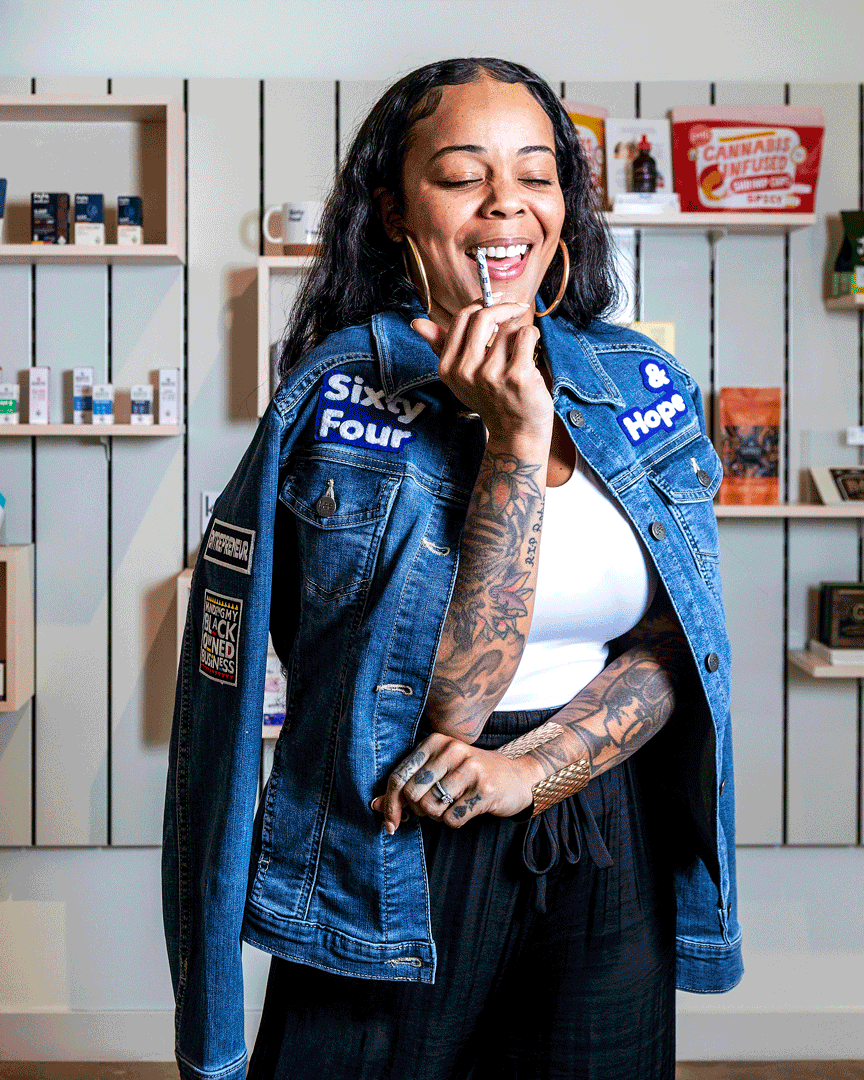
She was already familiar with Webb’s name, she said, because he’d been responsible for bringing a Buffalo Wild Wings franchise to her neighborhood. “I grew up in South Central, and a lot of stuff would pop up and then close down within a year. So when a Buffalo Wild Wings opened, it was good for the community — for our community.”
After being introduced to the concept of the social equity program and how 4thMVMT was trying to help applicants open dispensaries under the Sixty Four & Hope nameplate (the numbers refer to Proposition 64, which legalized recreational weed), it didn’t take her long to seize the opportunity.
“At the very first [information] session, I was sold,” she said. “I had chills, and I was just like, ‘Damn, this is crazy.’ And it felt good. ... I used to run a flagship store that did $12 million a year [in sales], and I wasn’t even getting paid a hundred grand a year. If I could make a million dollars a year for this company, imagine what I could do for myself and my community. It was a no-brainer for me.”
In September, the first of the Sixty Four & Hope dispensaries opened — with Allen as majority owner — at the high-traffic corner of La Cienega Boulevard and Guthrie Avenue in Mid-City, just two blocks from the 10 Freeway. (The second — with a different social equity applicant — opened on Melrose Avenue on New Year’s Eve.)
Allen said that although the Sixty Four & Hope shops will have a mostly uniform look — a clean, minimalist Apple-store vibe with pops of faux greenery — each will have details that subtly reflect its owner’s aesthetic. “So for me, as a part of the LGBTQ community, I’m going to eventually put some artwork of Queen Latifah’s iconic performances up on the walls,” Allen said. “I want it to feel powerful, feminine and soft in here.”
Whitney Beatty, Josephine & Billie’s
Beatty’s long journey to owner and operator of one of the coolest-themed dispensaries in the Southland was marked by roadblocks. Her initial investors went out of business, and she was left with an empty storefront for nearly a year. The single mother of one, whose other job was creating cool cannabis humidors (you can find one featured in The Times’ 2020 gift guide), was struggling to stay afloat while navigating the process.
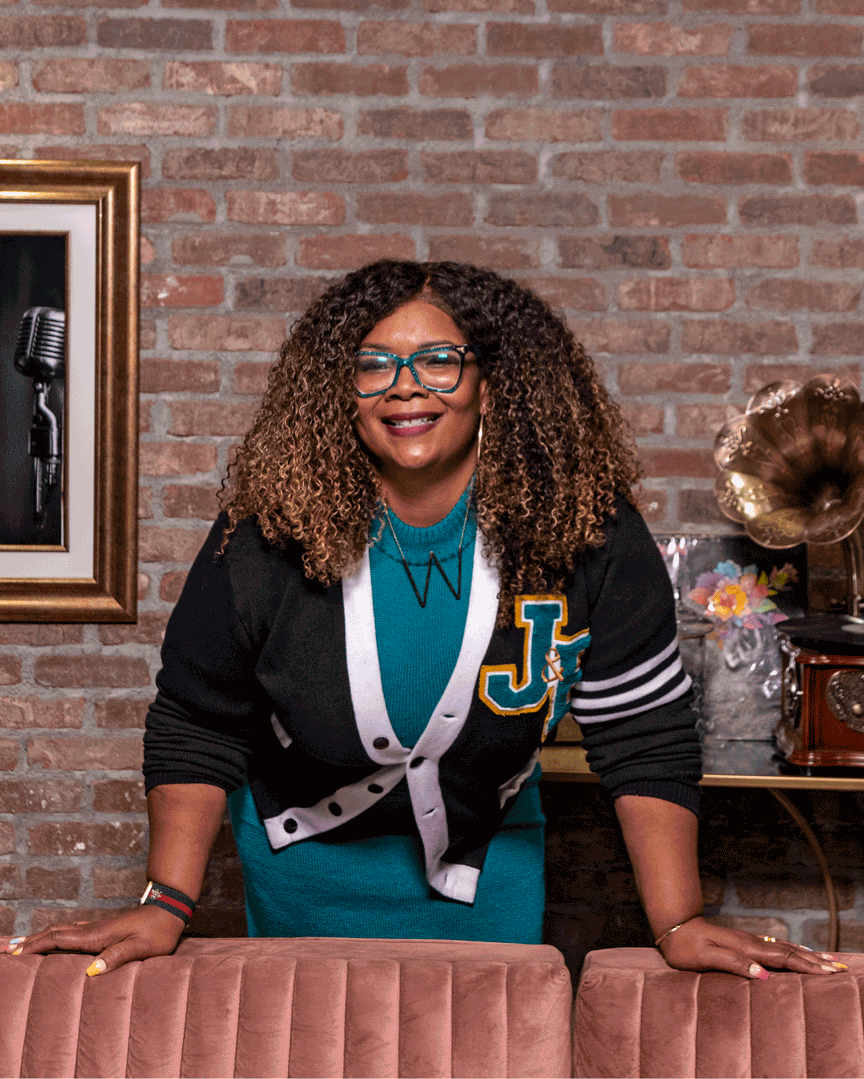
In October 2021, thanks to new investors (including the Parent Co.’s Jay-Z- and Desiree Perez-led social equity ventures fund, which chose the dispensary as its first investment) and the efforts of a kindred spirit (Chief Operating Officer Ebony Andersen), Josephine & Billie’s opened its doors in Exposition Park. Named after Josephine Baker and Billie Holiday, it was envisioned to cater specifically to the needs of women of color and focus on the health and wellness aspects of cannabis, facts Beatty says made raising the necessary capital particularly challenging.
“I was yelling at every investor because they were telling me the same thing about [appealing to the] general cannabis consumer, [appealing to] white male cannabis consumers. I was like, ‘Black women are trendsetters. Black women have spent money on health and beauty for years. Black women spend $1.5 trillion annually. We spend money. Women control household spending. How are you telling me we don’t matter?’”
Even before opening the 1,500-square-foot space, Beatty and Andersen were making plans to expand into the 3,000-square-foot laundromat next door, in which, in addition to more retail space and a delivery service hub, they hope to include a consumption lounge. After that, there are plans to expand the store concept into other states.
Rayford Brown, the Green Paradise
A dozen years ago — long before recreational cannabis was legal in the Golden State — military veteran Brown decided to sell cannabis to make ends meet. That decision landed him behind bars for three years of a five-year sentence. “I got started because of the recession,” Brown said. “And they caught me with 38 baggies in my bag.” He calls it a hard lesson but a good one too. “Because I probably would have never been to college [otherwise],” he said. “It really occupied my mind — made me think about another avenue. I look at things differently now, compared to before I went in.”
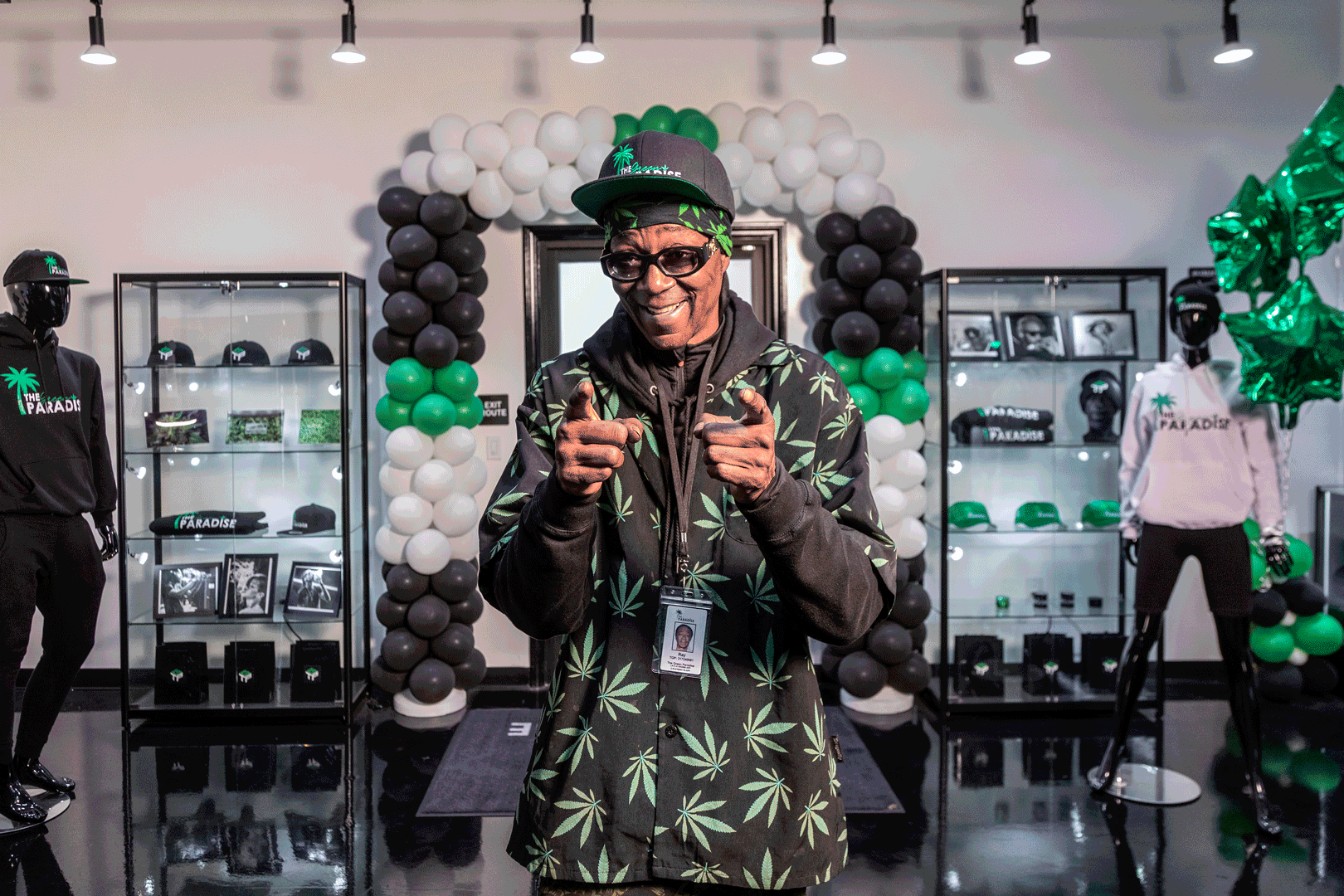
He would go on to earn two associate’s degrees from Santa Monica College (one in solar technology and the other in the field of environmental sciences) and graduated in 2017. It was around that time, while he was working to get a solar business going, that he was introduced by his brother to Brandon Brinson and Evelyn Scott-Brinson, a married couple who had been struggling to get a dispensary project of their own off the ground. The three eventually would become business partners in the Green Paradise dispensary in Mid-Wilshire.
“When this [opportunity] first came along, I was like, ‘Are you serious? Are you really trying to help us?’” Brown said. “The more I talked to them, and the more I learned [about the program], the more I realized it’s giving me — all of us — an opportunity to have a second chance in life and to actually do something to impact the community.”
Brown and his business partners point out that they came extremely close to not having the opportunity at all. Of the initial 200 applications the city agreed to process, Scott-Brinson says they received license No. 200 — the very last one.
Where are the social equity marijuana dispensaries in Los Angeles? Check out our list of weed shops built on social justice and community vibes.
Their 1,600-square-foot space on a busy stretch of La Brea Avenue in Mid-Wilshire officially opened Jan. 1. While Brinson and Scott-Brinson run day-to-day operations, Brown meets with them weekly to discuss sales, product mix and business strategy. When he’s not focusing on the dispensary business, Brown works on solar projects “as kind of a hobby right now.” He hopes the income from his stake in the dispensary eventually will help him turn that hobby into a full-fledged business.
Asked if being the majority owner of a cannabis dispensary feels like compensation for his past run-in with the law, Brown shook his head slowly. “No, man. I saw some stuff in there. I can never get those years back,” he said. “But it’s like I said to a friend of mine, ‘I get a chance to right a wrong, [to] turn a negative into a positive.’”
Brett Feldman, Wonderbrett
Feldman, the namesake of the Wonderbrett brand, has been on the Southern California weed scene for a long time, getting his start as a grower in the late ’90s medical-only days, leveraging a chance encounter with a cut of OG Kush into a cannabis empire built with business partner Cameron Damwijk around fruity-sounding strains such as Beyond Blueberry, Orange Sunset and Pineapple OZ Kush, and music industry collabs with the likes of Atlanta rapper Russ, singer-producer Poo Bear and rapper B-Real.
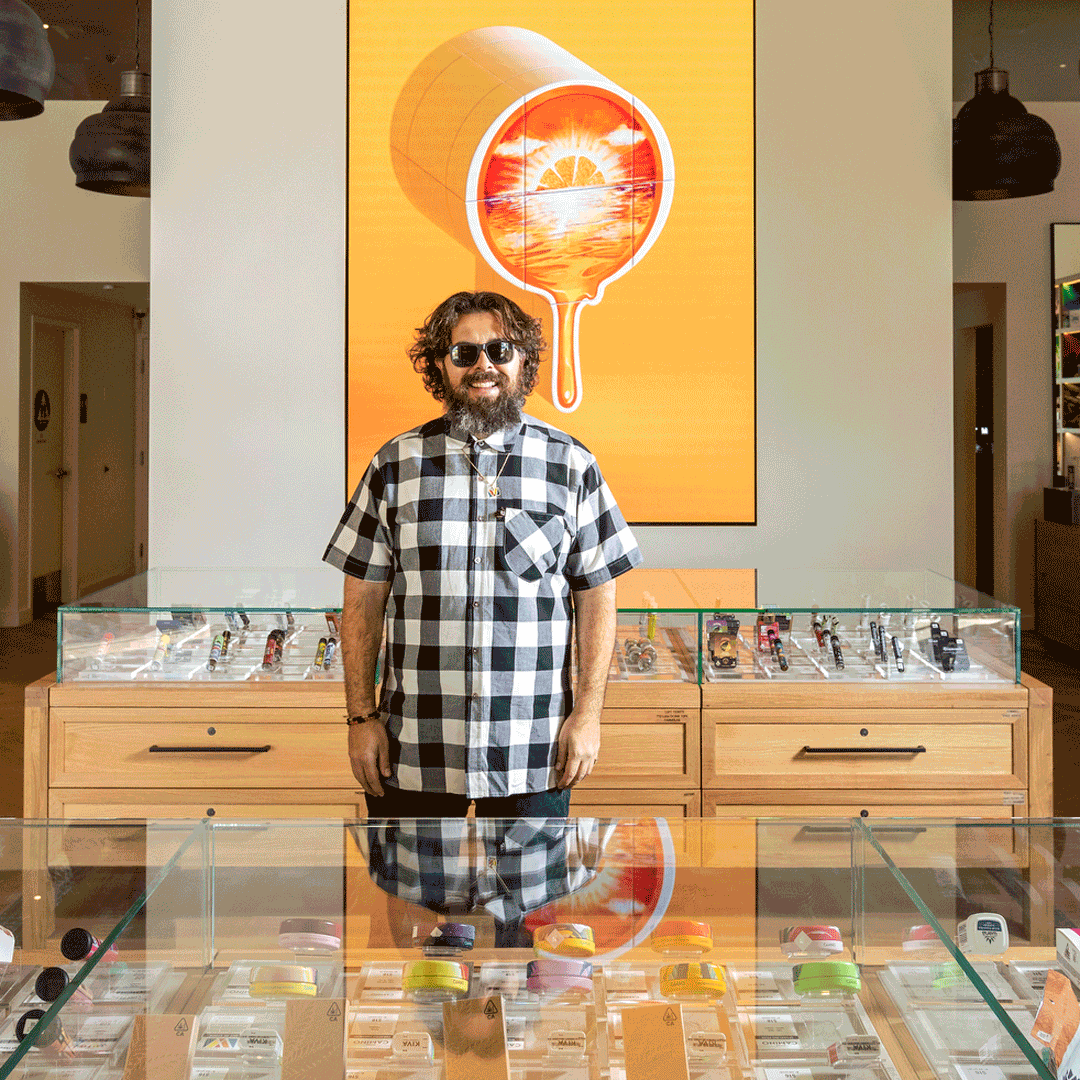
The cultivation (based in a 22,000-square-foot Long Beach facility) and manufacturing (including vape pens and prerolls) sides of the business aren’t part of the city’s social equity program, but the La Brea Avenue storefront, which opened in July 2021 (with a star-studded bash that included a Snoop Dogg pop-in) is, thanks to Feldman’s early-aughts run-in with the law.
“It was 2 in the morning, and I was sitting in my parked car in front of my recording studio using my laptop, because that’s where the Wi-Fi worked the best,” Feldman recalled. “And the cops who were driving by turned around and parked their car and knocked on my window. I smelled like weed because I’d just been smoking in the studio.”
His arrest on suspicion of marijuana possession with intent to distribute (he had a scale with him) was the beginning of eight months of legal wrangling that he says ultimately resulted in the case being dismissed. “I feel very blessed and lucky to have made it this far,” Feldman says, “and to be unlucky enough to get myself arrested and qualify for the social equity program.”
Randy Hill, Erb & Arbor
When we first reached out to the social equity stakeholder in Panorama City’s Erb & Arbor dispensary, the first thing Hill said was he wanted his attorney (Joseph Adeife), as well as his co-owners (Sev Toroussian and Mauro Lara) to be involved. This wasn’t because he feared legal action but because he felt their efforts — particularly Adeife’s — were key in landing him his license.
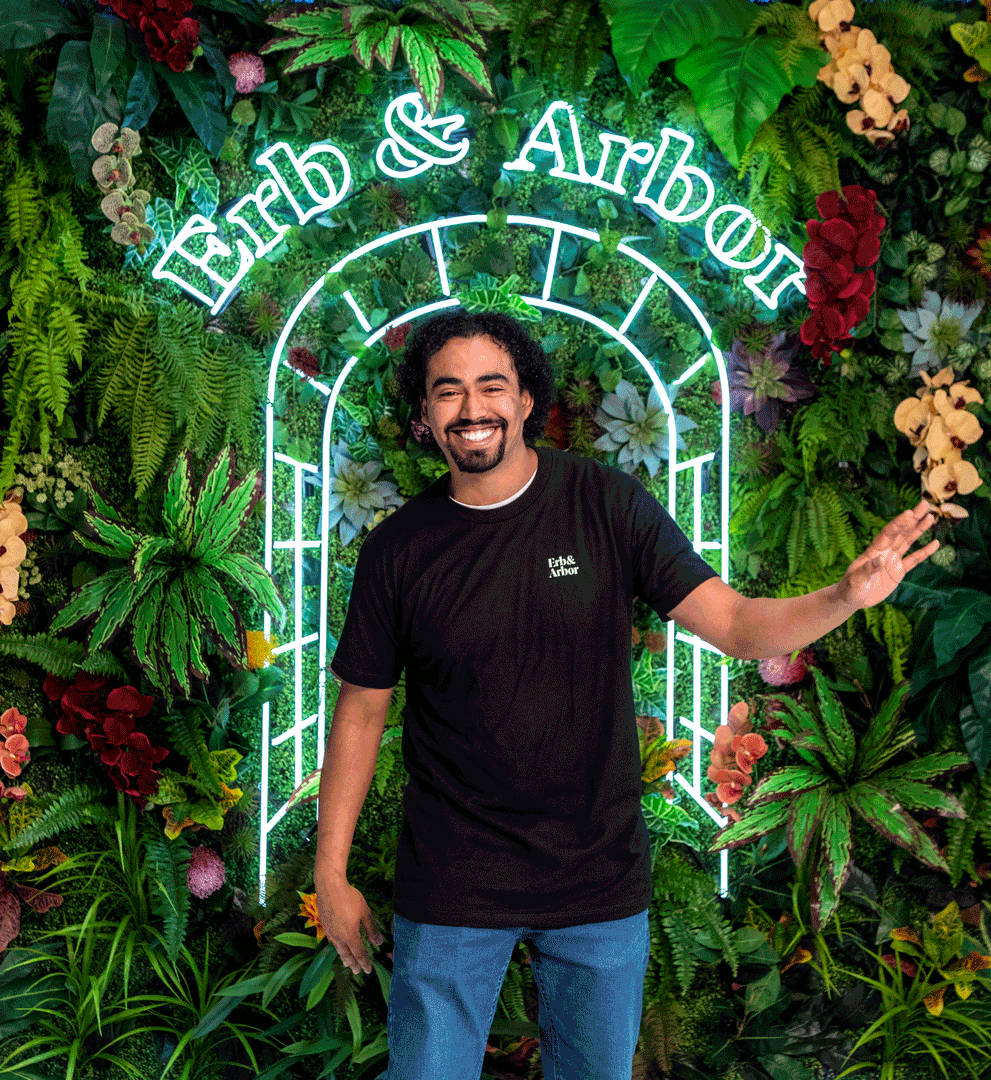
“I definitely wouldn’t have been able to do this without them, that’s for damn sure. They’ve helped me so much,” Hill said. “And Joseph was even doing it pro bono.”
Only after he was convinced that the rest of the team’s contributions had been duly noted did Hill seem comfortable talking about his own backstory, which began in late 2016 (or early 2017, he’s not exactly sure) when a friend persuaded him to leave his job helping third-graders at the after-school program L.A.’s Best to try his hand at cannabis cultivation.
“At first, I wasn’t really interested — I really loved working with kids,” he said. But his friend’s persistence won out and, before he knew it, Hill was working at the L.A.-based grower THC Design. “My first job was helping manage one of the warehouses — two little flower rooms,” he said. “It was small, but it was a good start for me, because it pushed me to get to know everything. ... And I found out I had a green thumb, so I ended up loving it.”
His cultivation connections eventually put him in the same orbit as Lara and Toroussian, and the threesome’s effort to open a dispensary began. That joint journey would continue for nearly three years and culminated in the dispensary’s opening in December 2021. While Hill is happy to let his partners handle the day-to-day business, he says he’ll tend to weigh in on things that key into his cultivation background, such as trendy strains to stock. “Double Stuffed Oreoz is one of those,” Hill said. “And Rainbow Runtz is another.” (The former is described as having a sweet and creamy aroma with chocolate undertones, the latter as earthy with notes of berry and pine.)
Pair a little pot with these activities to see the city through new (if bloodshot) eyes.
Eventually, Hill wants to pursue his passion for the plant — on the cultivation side — beyond the Golden State. “I’d like to be a multistate operator,” he said. “One of my old bosses moved to Colorado and Oklahoma, so maybe one of those states.” (Colorado, the first state to legalize recreational weed, is seen as a more stable market, while medical-only Oklahoma has fewer regulations, a lower bar to entry and a strategic appeal if cannabis ever becomes legal coast to coast.) But for now, he’s focused on nurturing a 4-month-old seedling of sorts.
“You want to keep your cultivation facility disease-free,” he said, likening the dispensary to a grow facility. “That means no viruses, no insects, no powdery mildew. You have to focus on plant health; the healthier the plant, the better the product.”
Cynthia Hurtado, Pirate Town Cannabis Co.
Born in Mexico, Hurtado came to the U.S. at 17, became a mother at 18 and started working for Los Angeles County at 20. At 46, as a social equity applicant (and still a county employee), she took a second job as a DoorDash driver, flexed her credit card to its limit and cobbled together small sums of money from friends and family. And earlier this month, at 50, she threw open the doors of the Pirate Town Cannabis Co. at a minimall in San Pedro, just two blocks from the southern end of the 110 Freeway, sandwiched between a sneaker shop and a Chinese fast-food joint.
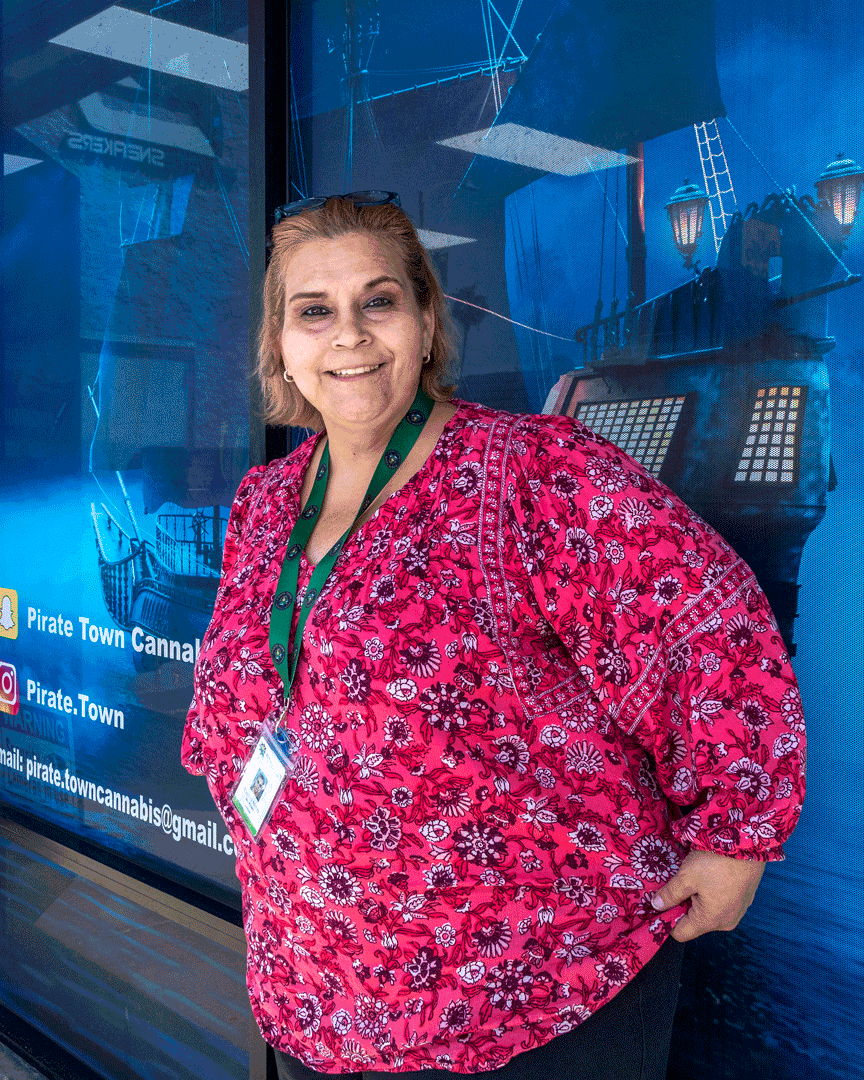
People think that “social equity” means this was handed to us. It was not handed to us. We worked hard to get this space.
— Cynthia Hurtado
“People think that ‘social equity’ means this was handed to us,” Hurtado said. “It was not handed to us. We worked hard to get this space. I put a lot of work into this dispensary.”
She says the most memorable moment of the process was when she finally found out that her four years of hard work had paid off. “I remember exactly where I was when I found out I got my state license,” Hurtado said. “I was at the grocery store with my mom when I got the email at 2:21 p.m. on March 8, 2022. I didn’t know if I wanted to cry or if I wanted to run or jump. There were so many emotions inside of me. I was excited, but it was bittersweet, because I’d been through so much....”
Kika Keith, Gorilla Rx Wellness
Perhaps the most prominent face — and loudest voice — of L.A.’s social equity scene belongs to Keith, the fairy godmother of the movement, who has arguably done as much as (if not more than) the city itself to shape the dispensary landscape thanks to her role as co-founder of the Social Equity Owners and Workers Assn. (SEOWA). That’s the group whose lawsuit against the city highlighted the troubled application-processing system and ultimately led to the settlement that doubled the first round of social equity licenses to 200. On top of that, she’s the founder of the Live Development Group, which by late January had helped more than 70 applicants; 15 of them have been granted licenses.
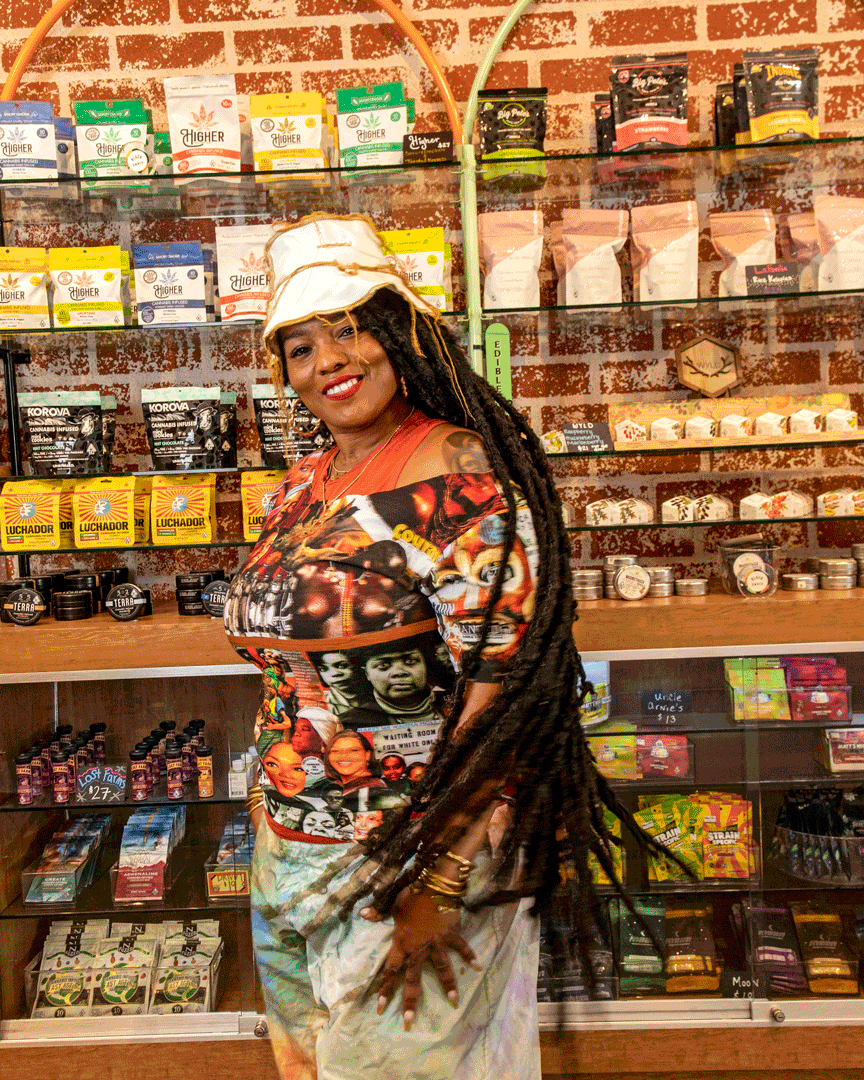
Before embarking on her adventures in cannabis commerce and activism, Keith honed her business skills slinging a different kind of green. In 2008, she says, successfully getting her brand of chlorophyll-enhanced water on the shelves of Whole Foods taught her a lot about business, focusing on wellness and tenacity. That earlier company, Gorilla Wellness, also inspired the name of her Crenshaw Boulevard dispensary — Gorilla Rx Wellness — which opened to great fanfare on Aug. 25.
But anyone who has spent more than five minutes with Keith will tell you that opening the doors of her riotously colorful, joyful neighborhood-proud shop, with its Crafted on Crenshaw neon sign, was not the end of the fight.
“We need to be proactive,” Keith said. “We need to have a whole flourishing supply chain for social equity brands.” She envisions a future where brands by and for people of color, women and the LGBTQ community are showcased, promoted and lifted up by the social equity dispensaries as a way of further leveling the playing field.
“If we just get a hundred of us open, with all of us having that extra consciousness about supporting our fellow social equity entrepreneurs ... then we’ve created a vertically integrated social equity ecosystem,” Keith said.
I tried yoga once. It was a disaster. Turns out, a little weed goes a long way to convert a longtime yoga hater.
“Yes, I think 100 dispensaries is the sweet spot. That gives us the ability to properly compete. That’s why I continue to organize. That’s why I continue to educate.”
Mike Saghian, the Artist Tree Koreatown
The Koreatown outpost of the Artist Tree art gallery-meets-weed shop concept was one of the city’s first social equity dispensaries to open — in April 2021 — thanks in large part to majority stakeholder Saghian’s ability to navigate the process. (Saghian’s partners in this space own and operate three additional Artist Tree shops, none of which is part of the social equity program.)
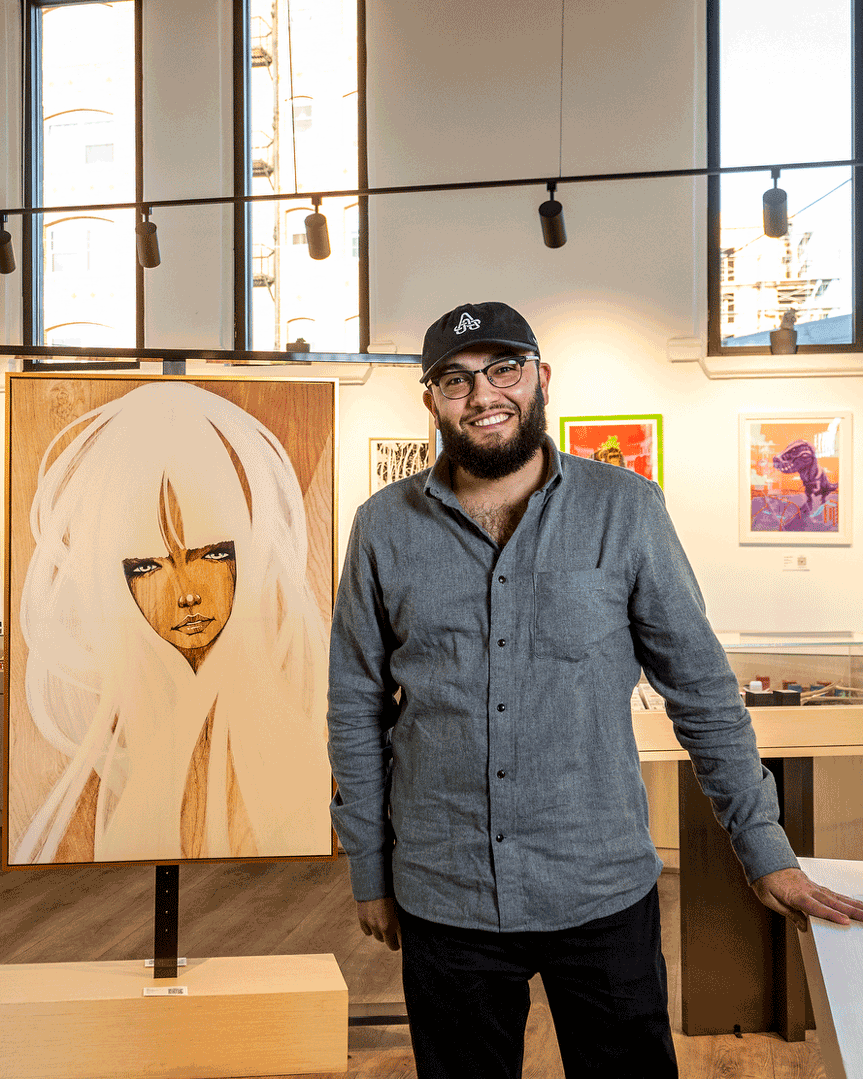
“It did have its complications,” Saghian said. “But I guess you could say I was a little bit lucky that I was [already] so involved in the licensing process and in the know. I’d done my research and was just waiting for that [first] round of licensing to open. And when it did, I just went ahead with it.”
His familiarity, he said, comes from the job he’s been doing pretty much since he graduated from high school — helping businesses with all the important but mind-numbing minutiae that come with being a business. “DBA filings, setting up corporations, getting city licenses, camping outside the courthouse,” he said. “I liked it, I was good at it and I’d built a loyal clientele.”
When some of that loyal clientele reached out to find out how to get into the medical marijuana business (“back in the medical cannabis days,” he notes), he immersed himself in research. He says he helped clients get dispensaries running before the city instituted a temporary moratorium on new ones in 2007. “When the new [recreational] regulations came out in 2018, I just kept doing the work.”
He joined forces with the Artist Tree team (Avi Kahan, Lauren Fontein and Mitchell Kahan) after the real estate he’d lined up fell through. (“You need a property lined up to apply,” he said, “and time was running out. I reached out to some friends and family, and a friend of a friend introduced us. The rest is history.”)
Saghian says he spends most of his time focused on his Van Nuys-based consulting business, the Biz Shop, but makes regular visits to the dispensary. “I come in from time to time to check up on stuff, but I’m mostly involved behind the scenes. I’m involved with all the big decisions — marketing, sales and product procurement.”
He thinks the general public has a skewed perception of what it’s like to be a player in L.A.’s legal weed business.
“It’s not all it’s made out to be, as far as being on the business-owner side of it,” he said. “It looks a lot easier than it is, and people think it’s a license to print money — but it’s not.”
More to Read
Sign up for The Wild
We’ll help you find the best places to hike, bike and run, as well as the perfect silent spots for meditation and yoga.
You may occasionally receive promotional content from the Los Angeles Times.

